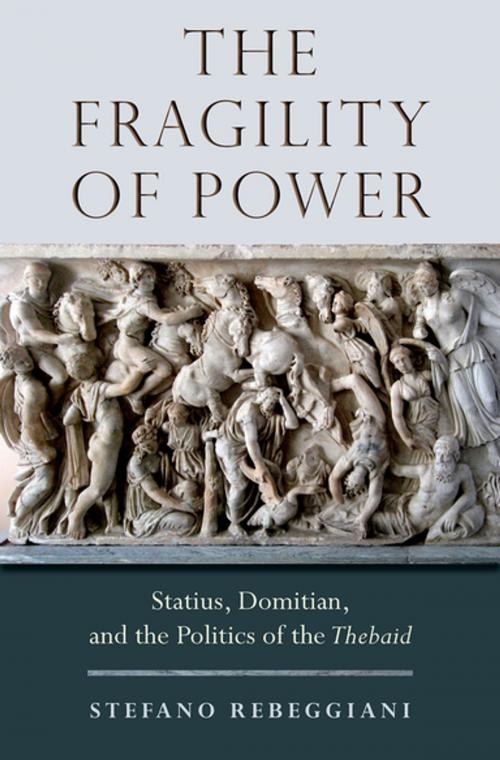The Fragility of Power
Statius, Domitian and the Politics of the Thebaid
Nonfiction, History, Ancient History, Rome, Fiction & Literature, Poetry, Literary Theory & Criticism| Author: | Stefano Rebeggiani | ISBN: | 9780190882921 |
| Publisher: | Oxford University Press | Publication: | September 10, 2018 |
| Imprint: | Oxford University Press | Language: | English |
| Author: | Stefano Rebeggiani |
| ISBN: | 9780190882921 |
| Publisher: | Oxford University Press |
| Publication: | September 10, 2018 |
| Imprint: | Oxford University Press |
| Language: | English |
Statius' narrative of the fraternal strife of the Theban brothers Eteocles and Polynices has had a profound influence on Western literature and fascinated generations of scholars and readers. This book studies in detail the poem's view of power and its interaction with historical contexts. Written under Domitian and in the aftermath of the civil war of 69 CE, the Thebaid uses the veil of myth to reflect on the political reality of imperial Rome. The poem offers its contemporary readers, including the emperor, a cautionary tale of kingship and power. Rooted in a pessimistic view of human beings and human relationships, the Thebaid reflects on the harsh necessity of monarchical power as the only antidote to a world always on the verge of returning to chaos. While humans, and especially kings, are fragile and often the prey of irrational passions, the Thebaid expresses the hope that an illuminated sovereign endowed with clementia (mercy) may offer a solution to the political crisis of the Roman empire. Statius' narrative also responds to Domitian's problematic interaction with the emperor Nero, whom Domitian regarded as both a negative model and a secret source of inspiration. With The Fragility of Power, Stefano Rebeggiani offers thoughtful parallels between the actions of the Thebaid and the intellectual activities and political views formulated by the groups of Roman aristocrats who survived Nero's repression. He argues that the poem draws inspiration from an initial phase in Domitian's regime characterized by a positive relationship between the emperor and the Roman elite. Statius creates a number of innovative strategies to negotiate elements of continuity between Domitian and Nero, so as to show that, while Domitian recuperated aspects of Nero's self-presentation, he was no second Nero. Statius' poem interacts with aspects of imperial ideology under Domitian: Statius' allusions to the stories of Phaethon and Hercules engage Domitian's use of solar symbols and his association with Hercules. This book also shows that the Thebaid adapts previous texts (in particular Lucan's Bellum Civile) in order to connect the mythical subject of its narrative with the historical experience of civil war in Rome in 69 CE. By moving past recent solely aesthetic readings of the Thebaid, The Fragility of Power offers a serious and thoughtful addition to the recent scholarship in Statian studies.
Statius' narrative of the fraternal strife of the Theban brothers Eteocles and Polynices has had a profound influence on Western literature and fascinated generations of scholars and readers. This book studies in detail the poem's view of power and its interaction with historical contexts. Written under Domitian and in the aftermath of the civil war of 69 CE, the Thebaid uses the veil of myth to reflect on the political reality of imperial Rome. The poem offers its contemporary readers, including the emperor, a cautionary tale of kingship and power. Rooted in a pessimistic view of human beings and human relationships, the Thebaid reflects on the harsh necessity of monarchical power as the only antidote to a world always on the verge of returning to chaos. While humans, and especially kings, are fragile and often the prey of irrational passions, the Thebaid expresses the hope that an illuminated sovereign endowed with clementia (mercy) may offer a solution to the political crisis of the Roman empire. Statius' narrative also responds to Domitian's problematic interaction with the emperor Nero, whom Domitian regarded as both a negative model and a secret source of inspiration. With The Fragility of Power, Stefano Rebeggiani offers thoughtful parallels between the actions of the Thebaid and the intellectual activities and political views formulated by the groups of Roman aristocrats who survived Nero's repression. He argues that the poem draws inspiration from an initial phase in Domitian's regime characterized by a positive relationship between the emperor and the Roman elite. Statius creates a number of innovative strategies to negotiate elements of continuity between Domitian and Nero, so as to show that, while Domitian recuperated aspects of Nero's self-presentation, he was no second Nero. Statius' poem interacts with aspects of imperial ideology under Domitian: Statius' allusions to the stories of Phaethon and Hercules engage Domitian's use of solar symbols and his association with Hercules. This book also shows that the Thebaid adapts previous texts (in particular Lucan's Bellum Civile) in order to connect the mythical subject of its narrative with the historical experience of civil war in Rome in 69 CE. By moving past recent solely aesthetic readings of the Thebaid, The Fragility of Power offers a serious and thoughtful addition to the recent scholarship in Statian studies.















